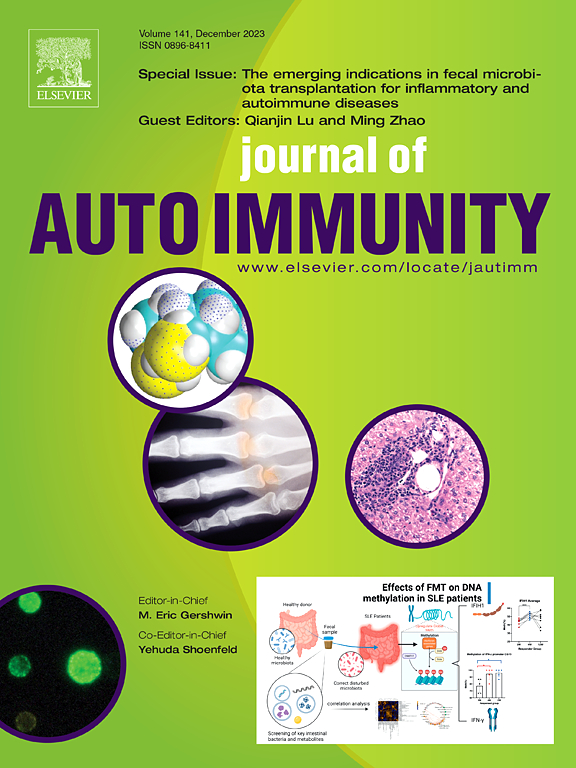靶向自身反应性B细胞上三种受体的CAR-T细胞治疗系统性红斑狼疮。
IF 7
1区 医学
Q1 IMMUNOLOGY
引用次数: 0
摘要
系统性红斑狼疮(SLE)是一种自身免疫性疾病,以B细胞活化失调、自身抗体产生和肾炎为特征。B细胞活化因子(BAFF)过表达增强自身反应性B细胞存活,驱动自身免疫。BAFF特异性贝利单抗和CD20特异性利妥昔单抗抗体用于SLE治疗,但不能治愈,这突出了替代B细胞消耗疗法的必要性。在这里,我们使用基于BAFF配体的嵌合抗原受体T (CAR-T)细胞靶向成熟B细胞和浆细胞上表达的BAFFr、BCMA和TACI。BAFF CAR-T细胞与来自SLE患者的外周血单个核细胞(PBMCs)共培养后,有效地杀死了B细胞,并在患者衍生的SLE异种移植人源化小鼠模型中通过将患者PBMCs注射到免疫功能低下的小鼠中。我们还生成了表达人BAFF CAR的小鼠CD8+ T细胞,以测试其对自发性(MRL/lpr)和普里斯坦诱导的SLE小鼠模型的治疗效果。在两种模型中,BAFF CAR-T细胞介导成熟B细胞的持续消除,导致自身抗体(IgM, IgG, Anti-ANA和Anti-dsDNA IgG)和蛋白尿的产生减少,并延长存活时间。将对照组MRL/lpr狼疮小鼠的B细胞过继转移到先前接受BAFF CAR-T治疗的MRL/lpr狼疮小鼠中,结果显示B细胞持续耗尽,存活时间延长。BAFF CAR-T治疗的潜在优势包括避免B细胞发育不全,因为早期B细胞不表达BAFF受体,以及防止长寿命浆细胞在BAFF CAR-T治疗后逃逸,因为它们表达BAFF受体。这些数据表明,基于细胞免疫疗法的方法有可能通过BAFF-CAR-T疗法诱导SLE发病机制缓解。本文章由计算机程序翻译,如有差异,请以英文原文为准。
CAR-T cell targeting three receptors on autoreactive B cells for systemic lupus erythematosus therapy
Systemic lupus erythematosus (SLE) is an autoimmune disease characterized by dysregulated B cell activation, autoantibody production, and nephritis. B cell activating factor (BAFF) overexpression enhances autoreactive B-cell survival, driving autoimmunity. BAFF specific belimumab and CD20 specific rituximab antibodies are used for SLE therapy but are not curative, highlighting the need for alternative B cell depletion therapies. Here, we use BAFF ligand based chimeric antigen receptor T (CAR-T) cells targeting BAFFr, BCMA and TACI expressed on mature B cells and plasma cells. BAFF CAR-T cells efficiently killed B cells after co-culture with peripheral blood mononuclear cells (PBMCs) from SLE patients and in a patient derived SLE xenograft humanized mouse model developed by injecting patient PBMCs into immunocompromised mice. We also generated murine CD8+ T cells expressing human BAFF CAR to test their therapeutic efficacy in spontaneous (MRL/lpr) and pristane induced mouse models of SLE. In both models, BAFF CAR-T cells mediated persistent elimination of mature B cells, resulting in a decrease in the production of autoantibodies (IgM, IgG, Anti-ANA, and Anti-dsDNA IgG) and proteinuria along with prolonged survival. Adoptive transfer of B cells from control MRL/lpr lupus mice to previously BAFF CAR-T treated MRL/lpr lupus mice showed continued depletion of B cells and prolonged survival. Potential advantages of BAFF CAR-T therapy include avoiding B cell aplasia as BAFF receptors are not expressed by early B cells and preventing the escape of long-lived plasma cells post BAFF CAR-T therapy as they express receptors of BAFF. These data demonstrate the potential for a cellular immunotherapy based approach to induce remission of SLE pathogenesis using BAFF-CAR-T therapy.
求助全文
通过发布文献求助,成功后即可免费获取论文全文。
去求助
来源期刊

Journal of autoimmunity
医学-免疫学
CiteScore
27.90
自引率
1.60%
发文量
117
审稿时长
17 days
期刊介绍:
The Journal of Autoimmunity serves as the primary publication for research on various facets of autoimmunity. These include topics such as the mechanism of self-recognition, regulation of autoimmune responses, experimental autoimmune diseases, diagnostic tests for autoantibodies, as well as the epidemiology, pathophysiology, and treatment of autoimmune diseases. While the journal covers a wide range of subjects, it emphasizes papers exploring the genetic, molecular biology, and cellular aspects of the field.
The Journal of Translational Autoimmunity, on the other hand, is a subsidiary journal of the Journal of Autoimmunity. It focuses specifically on translating scientific discoveries in autoimmunity into clinical applications and practical solutions. By highlighting research that bridges the gap between basic science and clinical practice, the Journal of Translational Autoimmunity aims to advance the understanding and treatment of autoimmune diseases.
 求助内容:
求助内容: 应助结果提醒方式:
应助结果提醒方式:


